 The City of London is to get blanket Wi-Fi, with city slickers able to access the Web anywhere within London’s famous financial district, the Square Mile.
The City of London is to get blanket Wi-Fi, with city slickers able to access the Web anywhere within London’s famous financial district, the Square Mile.
The scheme, run in partnership with London-based WiFi vendor The Cloud, is set to go live in the next few months and provide Wi-Fi access on streets and in open spaces throughout the City.
The Cloud’s unique open network concept lets different service providers offer WiFi services to its customers and supports high speed internet access, rich email access, music, video and other entertainment services, as well as the all-important VoIP services
The City network will comprise around 150 WiFi network “nodes” lurking inside lampposts, closed-circuit TV poles and street signs, offering connectivity to an estimated 350,000 Londoners as well as the hordes of tourists who regularly tramp through the area.
“This will allow people to have continuous online access, whether in a taxi or an open area, across the financial centre,” said Peter Bennett, a spokesman for the Corporation of London.
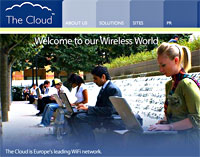 Unfortunately, unlike the free Wi-Fi service a few miles away in Islington, north London, the service won’t be free, with online access rates dependent on the rates charged by service providers.
Unfortunately, unlike the free Wi-Fi service a few miles away in Islington, north London, the service won’t be free, with online access rates dependent on the rates charged by service providers.
Roaming Wi-Fi enabled punters without a provider will have to fork out a fairly hefty £5 ($8.70 US) per hour to use the service.
Michael Snyder, the chairman of the City of London’s Policy Committee, said that the network would help the City maintain its position as the world’s leading financial centre, letting city workers and visitors to stay in touch with their office via handheld devices while on the move.
“The City is a fast moving environment and we are responding to the increasing time pressures faced by workers by providing the technology for them to stay up to date, wherever they are in the Square Mile,” he added.
 The move follows an announcement that The Cloud would be installing network hubs and rolling out WiFi in nine cities across Britain, including Edinburgh, Leeds, Manchester, Oxford and Liverpool.
The move follows an announcement that The Cloud would be installing network hubs and rolling out WiFi in nine cities across Britain, including Edinburgh, Leeds, Manchester, Oxford and Liverpool.
Three other London boroughs are also scheduled to go wireless in the next few months, which should help the UK keep its number two world ranking for wireless hotspot locations
According to figures from the Wi-Fi Alliance, the UK – along with the WiFi-tastic US – accounts for nearly half of the planet’s 10,800 wireless locations.
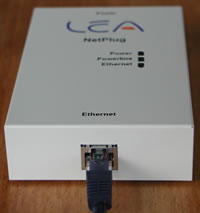 There’s a growing reliance and expectance of networks in the home to handle all of this digitised media that we want to chuck around our homes, from room to room.
There’s a growing reliance and expectance of networks in the home to handle all of this digitised media that we want to chuck around our homes, from room to room.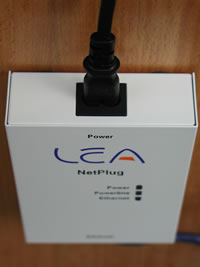 What’s involved in getting the network setup? Basically nothing. Take the power lead, plug it into one end of the NetPlug. The Ethernet (RJ45) goes in the other end.
What’s involved in getting the network setup? Basically nothing. Take the power lead, plug it into one end of the NetPlug. The Ethernet (RJ45) goes in the other end.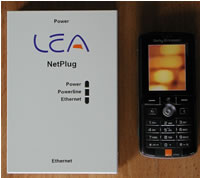 There are different ways of creating a computer network. A traditional wired network is the cheapest but takes the longest time to set-up, unless you do not mind trailing cables. PLC devices cost more but are the quickest to set-up, and do not require any new cables. Wireless networks are the most expensive but can take less time to set-up than a traditional wired network, and offer out of doors networking.
There are different ways of creating a computer network. A traditional wired network is the cheapest but takes the longest time to set-up, unless you do not mind trailing cables. PLC devices cost more but are the quickest to set-up, and do not require any new cables. Wireless networks are the most expensive but can take less time to set-up than a traditional wired network, and offer out of doors networking. Major UK consumer broadband providers NTL are teaming up with BitTorrent, the developers of the world’s most popular peer-to-peer (P2P) application.
Major UK consumer broadband providers NTL are teaming up with BitTorrent, the developers of the world’s most popular peer-to-peer (P2P) application.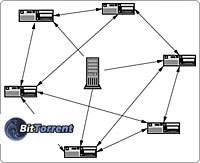 Naturally, rights holders and movie heavyweights weren’t too chuffed to see their content whizzing around the Internet for gratis, and quickly hired in squadrons of lawyers to apply pressure on BitTorrent.
Naturally, rights holders and movie heavyweights weren’t too chuffed to see their content whizzing around the Internet for gratis, and quickly hired in squadrons of lawyers to apply pressure on BitTorrent. ‘The Apprentice’ TV show has been a smash hit in the UK, much the same as it was in the US. The BBC now plan to use it as the ‘first extensive broadband experience,’ as part of the BBC TV Plus project.
‘The Apprentice’ TV show has been a smash hit in the UK, much the same as it was in the US. The BBC now plan to use it as the ‘first extensive broadband experience,’ as part of the BBC TV Plus project.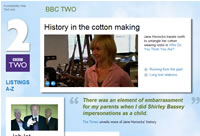 Initially looking at these advances it’s easy to get excited, but when looked in context of how long it’s taken, a frustrations come to the surface.
Initially looking at these advances it’s easy to get excited, but when looked in context of how long it’s taken, a frustrations come to the surface. (Funnily enough, after reading that article the person responsible for the project contacted us and it turned out to be someone whose previous work outside the BBC we’d been very impressed with.)
(Funnily enough, after reading that article the person responsible for the project contacted us and it turned out to be someone whose previous work outside the BBC we’d been very impressed with.) Sky has announced three of its top Exec will be altering roles, we suspect, as they prepare to become more than just a satellite TV company.
Sky has announced three of its top Exec will be altering roles, we suspect, as they prepare to become more than just a satellite TV company. We think Mike Darcey sounds like he’s going to have the most fun, and certainly the most toys to play with.
We think Mike Darcey sounds like he’s going to have the most fun, and certainly the most toys to play with. Several thousand rural surfers across Europe suddenly found themselves sans le Internet after European-based satellite broadband provider Aramiska unexpectedly slammed shut its operations with just five hours’ notice.
Several thousand rural surfers across Europe suddenly found themselves sans le Internet after European-based satellite broadband provider Aramiska unexpectedly slammed shut its operations with just five hours’ notice. The Community Broadband Network (CBN) is organising efforts to help Aramiska customers find an alternative satellite broadband supplier, with their director, Adrian Wooster, commenting, “The Aramiska issue totally caught our members unaware, and is causing many problems for rural businesses beyond simple connectivity; the Aramiska service was also hosting many Websites and has been offering file storage capabilities for businesses.”
The Community Broadband Network (CBN) is organising efforts to help Aramiska customers find an alternative satellite broadband supplier, with their director, Adrian Wooster, commenting, “The Aramiska issue totally caught our members unaware, and is causing many problems for rural businesses beyond simple connectivity; the Aramiska service was also hosting many Websites and has been offering file storage capabilities for businesses.” News has broken that two men in the UK have been found liable for file sharing their music. The first ruling of its kind in the UK.
News has broken that two men in the UK have been found liable for file sharing their music. The first ruling of its kind in the UK. Having been found liable, the two are now exposed to the BPI’s legal fees. Given the City law firms the BPI use, where it’s not unusual to pay £200/hours for their services, it’s going to be an expensive business. BPI have stated that “Total costs are estimated at £13,500 and damages are expected to take the bill even higher.”
Having been found liable, the two are now exposed to the BPI’s legal fees. Given the City law firms the BPI use, where it’s not unusual to pay £200/hours for their services, it’s going to be an expensive business. BPI have stated that “Total costs are estimated at £13,500 and damages are expected to take the bill even higher.” BT’s dominance of the UK home telephone is coming under fresh pressure as the phone call market becomes the most liberal in Europe. Previously, their pricing levels have had to be agreed in advance with the UK regulator Ofcom, but with it understood that this is going to be lifted soon, price cuts are expected.
BT’s dominance of the UK home telephone is coming under fresh pressure as the phone call market becomes the most liberal in Europe. Previously, their pricing levels have had to be agreed in advance with the UK regulator Ofcom, but with it understood that this is going to be lifted soon, price cuts are expected. Technical-savvy Skype callers have for a long time taken advantage of VoIP calling to obtain free or cheap calls.
Technical-savvy Skype callers have for a long time taken advantage of VoIP calling to obtain free or cheap calls. Web browser company Opera today announce they’re bring their Web browser with AJAX support to chips for use in Consumer Electronics (CE) applications.
Web browser company Opera today announce they’re bring their Web browser with AJAX support to chips for use in Consumer Electronics (CE) applications. They’ve been putting their browsers on different platforms for a while, like the
They’ve been putting their browsers on different platforms for a while, like the  We’re sure you, dear reader, know what AJAX is, but just incase – it stands for Asynchronous JavaScript and XML. This translates to being able to use a Web browser more like a computer-based application.
We’re sure you, dear reader, know what AJAX is, but just incase – it stands for Asynchronous JavaScript and XML. This translates to being able to use a Web browser more like a computer-based application. The most often cited example is Google’s Gmail.
The most often cited example is Google’s Gmail. Separately, a consolidating Carphone Warehouse has been on the acquisition trail and agreed the purchase of Tele2’s UK and Ireland operations, and separately, Onetel.
Separately, a consolidating Carphone Warehouse has been on the acquisition trail and agreed the purchase of Tele2’s UK and Ireland operations, and separately, Onetel. The purchase of Onetel from Centrica for £132 million includes £37.1 million, while will be delivered if Centrica deliver a targeted number of customers in the next three years via its British Gas operations. The Carphone Warehouse will also pay Centrica an additional £22.2 million if higher sign-up targets are met.
The purchase of Onetel from Centrica for £132 million includes £37.1 million, while will be delivered if Centrica deliver a targeted number of customers in the next three years via its British Gas operations. The Carphone Warehouse will also pay Centrica an additional £22.2 million if higher sign-up targets are met.